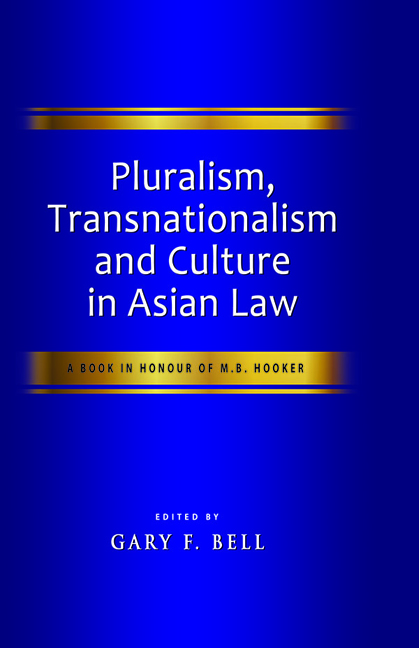Book contents
- Frontmatter
- Dedication
- Contents
- Preface
- Acknowledgements
- About the Contributors
- Chapter 1 M.B. Hooker and Southeast Asian Law: Path-breaking Passions
- Chapter 2 Asian Thought and Legal Diversity
- Chapter 3 Comparative Law, Anti-Essentialism and Intersectionality: Reflections from Southeast Asia in Search of an Elusive Balance
- Chapter 4 Legal Pluralism and Legal Anthropology: Experiences from Indonesia
- Chapter 5 Mapping the Relationship of Competing Legal Traditions in the Era of Transnationalism in Indonesia
- Chapter 6 Indonesia's Weak State Courts and Weak Law Fare Poorly in a Pluralist Commercial World
- Chapter 7 When Laws Are Not Enough: Ethics, Aesthetics, and Intra-Religious Pluralism in Contemporary Indonesia
- Chapter 8 Legal Pluralism and the Constitutional Position of East Malaysia's Indigenous Peoples: The View from the Longhouse
- Chapter 9 Sharia, State and Legal Pluralism in Indonesia: How Law Can You Go?
- Chapter 10 Negotiating Legal Pluralism in Court: Fatwa and the Crime of Blasphemy in Indonesia
- Chapter 11 Islamic Law in Israel: A Case Study in Legal Pluralism
- Chapter 12 The Road to Democracy Goes Through Religious Pluralism: The Indonesian Case and Thoughts on Post-Mubarak Egypt
Chapter 7 - When Laws Are Not Enough: Ethics, Aesthetics, and Intra-Religious Pluralism in Contemporary Indonesia
Published online by Cambridge University Press: 12 January 2018
- Frontmatter
- Dedication
- Contents
- Preface
- Acknowledgements
- About the Contributors
- Chapter 1 M.B. Hooker and Southeast Asian Law: Path-breaking Passions
- Chapter 2 Asian Thought and Legal Diversity
- Chapter 3 Comparative Law, Anti-Essentialism and Intersectionality: Reflections from Southeast Asia in Search of an Elusive Balance
- Chapter 4 Legal Pluralism and Legal Anthropology: Experiences from Indonesia
- Chapter 5 Mapping the Relationship of Competing Legal Traditions in the Era of Transnationalism in Indonesia
- Chapter 6 Indonesia's Weak State Courts and Weak Law Fare Poorly in a Pluralist Commercial World
- Chapter 7 When Laws Are Not Enough: Ethics, Aesthetics, and Intra-Religious Pluralism in Contemporary Indonesia
- Chapter 8 Legal Pluralism and the Constitutional Position of East Malaysia's Indigenous Peoples: The View from the Longhouse
- Chapter 9 Sharia, State and Legal Pluralism in Indonesia: How Law Can You Go?
- Chapter 10 Negotiating Legal Pluralism in Court: Fatwa and the Crime of Blasphemy in Indonesia
- Chapter 11 Islamic Law in Israel: A Case Study in Legal Pluralism
- Chapter 12 The Road to Democracy Goes Through Religious Pluralism: The Indonesian Case and Thoughts on Post-Mubarak Egypt
Summary
By the late 1960s it was clear that, in addition to many other challenges, the newly independent nations of Southeast Asia faced ongoing complexities resulting from the mix of legal systems they had inherited from their pre-modern and colonial pasts. M.B. Hooker experienced the situation at first hand when, as a young lecturer in law at the then University of Singapore, he observed the laws of Singapore, Malaysia, and Indonesia operating in a range of contexts, including religious courts, at local and national levels. In 1975, several years after leaving Southeast Asia, he published a study of legal pluralism, which he defined as “the situation in which two or more laws interact”. The aim of the study was “to describe the systems of legal pluralism in the contemporary world which have resulted from the transfer of whole legal systems across cultural boundaries”, and he made it clear that what interested him was the action of law as an agent of social change.
Twenty-five years after his study on legal pluralism was published, Professor Hooker began an extended analysis of a diverse range of fatwas in modern Indonesia using materials that were very different from those used in his 1975 book. He was, however, still interested in the nature of pluralism, albeit pluralism within the framework of the same legal system — Islam in Indonesia — and expressed in the form of fatwas. He wrote, “It is important to stress that there is variation in principle and practice because multiplicity of principle and practice is the lifeblood of law and dogma”.
The point to make here is that Professor Hooker's research into legal pluralism began with analyses of differences among systems and later focussed on differences within the same system of laws (Islam). One of his primary interests remains the dialectic/dialogic relationship between the system and the society in which it is expressed. In the analysis of fatwas, he described in some detail the methods developed by a range of Indonesian religious scholars to apply Islamic law to problems confronting modern Indonesian Muslims. He argues that the fatwas are a means to knowing Indonesian Islam as it is understood and expressed at a particular time in its Indonesian context.
- Type
- Chapter
- Information
- Pluralism, Transnationalism and Culture in Asian LawA Book in Honour of M.B. Hooker, pp. 151 - 177Publisher: ISEAS–Yusof Ishak InstitutePrint publication year: 2017

